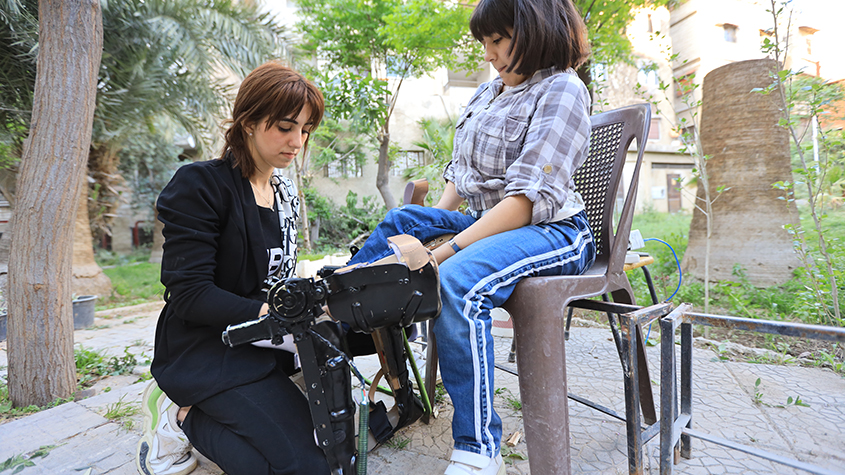Syrian engineering student’s award-winning exoskeleton promises to change lives
Charity began at home for Hekma Jabouli, who was moved by her young sister’s paralysis to invent a remote-controlled exoskeleton to help her walk. Her patent-protected invention, KAFO, offers people living with paralysis an affordable option to regain mobility and independence. Jabouli’s dream is to see her invention go into global production and become widely available to all those needing assistance. Jabouli captured her touching innovation journey in a video, which she later submitted to the World Intellectual Property Youth Video Competition to mark World Intellectual Property Day in April 2022.

Necessity was indeed the mother of invention for the enterprising engineer who is passionate about humanitarian work and social impact. Expensive and inefficient prosthetics inspired Jabouli to develop the electromechanical and easy-to-use prosthetic, an improved version of her first mechanical invention.
It took the University of Damascus graduate more than three years to get her invention through design and testing to create the final smart model that now integrates machine learning, artificial intelligence and the Internet of Things. Her prototype attracted a lot of interest from prospective investors at the 2018 Al-Basel Exhibition for Creativity and Invention, which encouraged her to see her project through and protect the invention with a patent.
A satisfied smile from her sister Ghazal is a priceless acknowledgement of the impact of Jabouli’s work. “My sister motivated me to design this mobility device. After seeing my frustration at not being able to source an affordable device that was not too mechanical to help her walk, she reminded me that since I was studying medical engineering, I could make the device myself. And that’s exactly what I did,” says Jabouli, happy that her sister Ghazal is now full of energy and enjoying life even though she needs an operation on her spine to help her walk normally once again.
Jabouli has now secured a patent on her invention, which is now in production, giving hope to many others suffering the same plight as her sister Ghazal. At just USD 1,000 a unit, the KAFO is a fraction of the cost of competing products, which retail at around USD 30,000. Jabouli’s vision is to scale the production of the KAFO and deliver it to the global market.
Getting to this point was not a walk in the park. Jabouli’s innovation journey through up a number of challenges. "Some of the challenges I had to contend with to produce the KAFO are insufficient capital, unreliable electricity and scarcity of parts," Jabouli notes. But where there is a will, there is a way. Her patience and persistence eventually paid off. She has since set up, Otech, a start-up specializing in the design and production of mobility devices to help patients living with paralysis walk again. It is the realization of her dream to be an inventor.
“Invention begins with an idea to solve a problem. Turning this idea into a functional product is the challenge we have to deal with as inventors. I get satisfaction from the positive impact of technologies in our lives, like the exoskeleton that improves mobility for those who are paralyzed,” says Jabouli. That accomplishment was recognized by WIPO, who awarded her the WIPO Medal for Inventors in 2019, which honors the contribution of outstanding inventors to national wealth and development.
Jabouli also won first prize in the 2022 World Intellectual Property Youth Video Competition with her video entry, which recounts how she came to develop her exoskeleton. Jabouli topped a competitive list of 142 submissions from 63 countries. A short-list of entries were submitted to a public vote. More than a third of the 36,819 votes cast favored her short video, an emotive narrative about a personal drive to help her paralyzed sister walk and sit again after suffering a spinal injury from shrapnel.